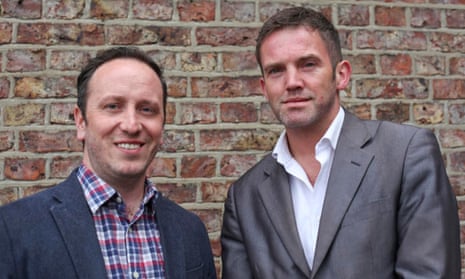Describe the business in a nutshell
Navada is a digital media group that develops new ways to create, innovate and deliver content to global audiences online. We use digital marketing and technical skills to innovate content through new applications, new ways of making content interactive, and new ways of allowing audiences to control the content.
What did you do before you started the business?
Myself and [co-founder] Jeremy Forsberg come from slightly different backgrounds. Mine was in innovative technology and digital media, and his was political campaigning. Our core belief is in storytelling: making stories to entertain people, to inform people, to sell to people.
What do you mean by storytelling?
We engage digital audiences by reflecting human experience, showing people “themselves”, in stories, to get them to absorb campaign messages and buy, join, share or tell their own stories – whatever the desired outcome is.
We also champion real people in our content-led campaigns, and encourage growing social media communities around a campaign to feel empowered enough to share their experiences.
Tell me about two of the campaigns that you’re proud of
We worked with the largest global manufacturer of wipes and nonwovens called Suominen. We developed a brand from scratch, called We Love Wipes, which has allowed them to connect directly to end consumers all over the world for the first time. Through compelling content across social media in particular we reached seven million end consumers and funnelled many new product innovation ideas in their R&D function.
Another campaign, Road Respect, targeted young male drivers across social media with high impact video and animation and supporting content. We took a very controversial view by entertaining this target group, then punching hard with life/death messages.
Digital media is a saturated market – what sets you apart?
We are smaller, faster and cheaper, which is refreshing for some of the biggest clients in digital media and for brands. Many of our top competitors are now almost too big – it’s less about the content and more about big volumes and big numbers. We know that brands and media giants are tired of “vanity volumes” and want more creativity, more innovation around content and more return on investment.
And what’s this about a film?
We have both wanted to be filmmakers all our lives and we have just produced our first feature film, called Pranking Rachel. The film and TV world is an extension of what we do currently – we just made the film for ourselves, not the client.
What been the most difficult aspect of running the business?
Where we have struggled has been in certain skill areas, particularly on the technical side. And we have discovered that when we outsource something we lose control. For a small business we do have to outsource particular skills now and again. It is very difficult to know a supplier’s capabilities and what they can deliver. We have had a few moments, especially in the more technical projects, when we have been let down.
What’s next for the business?
We have just launched an office in LA, so we will develop the business in LA and start working with bigger brands. We are really going to punch above our weight in the next 12 months, and we are going to expand on what we do in Europe.
How prepared were you to go it alone?
We knew what to expect but that didn’t make it any easier. However we have used our experiences to put together a very young team, and we try to nurture very young talent. We have an 18-year-old apprentice for example, in our office in Newcastle.
What advice would you offer to budding entrepreneurs?
You need to work out your niche before you make the leap. Our business has changed a lot since we started – we thought we knew what we were but we discovered that starting at the bottom of a saturated market was very, very difficult. Companies that focus on one thing grow faster.
Matthew Scott is CEO of the Navada Group
Sign up to become a member of the Guardian Small Business Network here for more advice, insight and best practice direct to your inbox.

Comments (…)
Sign in or create your Guardian account to join the discussion